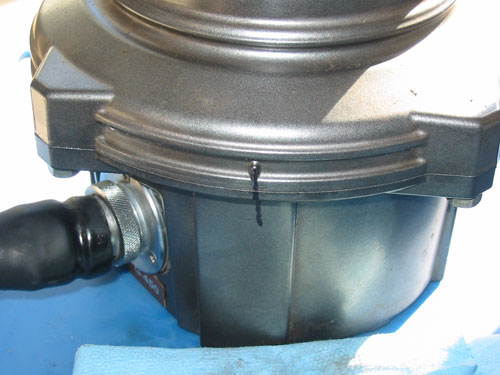MMR40 PTO Permeability Test
MMR40 PTO Permeability Test
With the components supplied with the MMR40 Kit, I cannot quite span the entire 40 Meter band. I was thinking that perhaps a different type of screw might cover more of the band. I’m only short about 25kc at the bottom, and 15kc at the top.
So I went to the local Ace Hardware store to see what kind of #6 screws they have for sale.
I found 4 varieties: brass, aluminum, stainless steel and an unmarked bin that I hoped was plain steel.
After bringing the screws back, I set up an experiment:
Find the edge of the spread without any screw in place. This turned out
to be 2.839 Mhz on the CW segment, and 2.713 Mhz on the phone segment.
The final frequency is 10.0 Mhz minus the PTO frequency, so these work
out to be 7.161 Mhz for the upper CW segment Frequency, and 7.287 for
the upper Phone Segment frequency.
Take a voltage a frequency reading with the screw extracted
Insert the screw under test all the way to its stop.
Take a voltage and frequency reading with the screw inserted all the way in.
Results:
Brass Screw
CW Segment
Screw Out PTO Frequency: 2.839 Mhz
Screw In PTO Frequency: 2.973 Mhz
Screw Out Final Frequency: 7.161 Mhz
Screw In Final Frequency: 7.027 Mhz
Screw Out PTO Voltage: 6.7 vpp
Screw In PTO Voltage: 4.6 vpp
Band Spread: 134 kHz
Voice Segment
Screw Out PTO Frequency: 2.713 Mhz
Screw In PTO Frequency: 2.841 Mhz
Screw Out Final Frequency: 7.287 Mhz
Screw In Final Frequency: 7.159 Mhz
Screw Out PTO Voltage: 6.7 vpp
Screw In PTO Voltage: 4.6 vpp
Band Spread: 128 kHz
Aluminum Screw
CW Segment
Screw Out PTO Frequency: 2.839 Mhz
Screw In PTO Frequency: 2.861 Mhz
Screw Out Final Frequency: 7.161 Mhz
Screw In Final Frequency: 7.139 Mhz
Screw Out PTO Voltage: 6.7 vpp
Screw In PTO Voltage: 4.4 vpp
Band Spread: 22 kHz
Voice Segment
Screw Out PTO Frequency: 2.713 Mhz
Screw In PTO Frequency: 2.811 Mhz
Screw Out Final Frequency: 7.287 Mhz
Screw In Final Frequency: 7.189 Mhz
Screw Out PTO Voltage: 6.7 vpp
Screw In PTO Voltage: 4.4 vpp
Band Spread: 98 kHz
It appears that aluminum has a strong frequency sensitivity problem at 40 meters, as the span on the low end of the PTO range is about 4x that on the high end of the PTO range. This appears to be unsuitable for a PTO at this frequency.
Stainless Steel Screw
CW Segment
Screw Out PTO Frequency: 2.839 Mhz
Screw In PTO Frequency: 2.941 Mhz
Screw Out Final Frequency: 7.161 Mhz
Screw In Final Frequency: 7.059 Mhz
Screw Out PTO Voltage: 6.7 vpp
Screw In PTO Voltage: 3.0 vpp
Band Spread: 102 kHz
Voice Segment
Screw Out PTO Frequency: 2.713 Mhz
Screw In PTO Frequency: 2.811 Mhz
Screw Out Final Frequency: 7.287 Mhz
Screw In Final Frequency: 7.189 Mhz
Screw Out PTO Voltage: 6.7 vpp
Screw In PTO Voltage: 2.9 vpp
Band Spread: 98 kHz
Stainless is nearly as good as brass as far as band spread goes, but note that the level drops off quite a bit more than brass as the screw is inserted.
The fourth screw I picked up at Ace Hardware turned out to be aluminum, rather than steel, based on the permeability testing that acted exactly like the first aluminum screw.
Next, I thought I would try some other materials that screws might be made of. I didn’t find any screws of these materials, but I did have some tools and supplies made out of them.
Carbon Steel
CW Segment
Screw Out PTO Frequency: 2.839 Mhz
Screw In PTO Frequency: 2.828 Mhz
Screw Out Final Frequency: 7.161 Mhz
Screw In Final Frequency: 7.172 Mhz
Screw Out PTO Voltage: 6.7 vpp
Screw In PTO Voltage: < 0.5 vpp
Band Spread: 11 kHz
Voice Segment
Screw Out PTO Frequency: 2.713 Mhz
Screw In PTO Frequency: 2.692 Mhz
Screw Out Final Frequency: 7.287 Mhz
Screw In Final Frequency: 7.308 Mhz
Screw Out PTO Voltage: 6.7 vpp
Screw In PTO Voltage: < 0.5 vpp
Band Spread: 21 kHz
Notice that the oscillation level drops to nearly zero as the carbon steel is inserted further into the coil. This makes it unsuitable for a PTO at these frequencies. Note also that the frequency change is opposite that of Brass and Aluminum.
Steel
CW Segment
Screw Out PTO Frequency: 2.839 Mhz
Screw In PTO Frequency: 2.829 Mhz
Screw Out Final Frequency: 7.161 Mhz
Screw In Final Frequency: 7.171 Mhz
Screw Out PTO Voltage: 6.7 vpp
Screw In PTO Voltage: < 0.5 vpp
Band Spread: 10 kHz
Voice Segment
Screw Out PTO Frequency: 2.713 Mhz
Screw In PTO Frequency: 2.700 Mhz
Screw Out Final Frequency: 7.287 Mhz
Screw In Final Frequency: 7.300 Mhz
Screw Out PTO Voltage: 6.7 vpp
Screw In PTO Voltage: < 0.5 vpp
Band Spread: 13 kHz
Steel acts very similar to carbon steel, with the positive frequency shift and the falloff of oscillation levels.
Solder
CW Segment
Screw Out PTO Frequency: 2.839 Mhz
Screw In PTO Frequency: 2.850 Mhz
Screw Out Final Frequency: 7.161 Mhz
Screw In Final Frequency: 7.150 Mhz
Screw Out PTO Voltage: 6.7 vpp
Screw In PTO Voltage: 5.8 vpp
Band Spread: 11 kHz
Voice Segment
Screw Out PTO Frequency: 2.713 Mhz
Screw In PTO Frequency: 2.724 Mhz
Screw Out Final Frequency: 7.287 Mhz
Screw In Final Frequency: 7.276 Mhz
Screw Out PTO Voltage: 6.7 vpp
Screw In PTO Voltage: 5.8 vpp
Band Spread: 11 kHz
Solder has the right direction for the shift, but only results in about 11 kHz of bandspread… Not so good.
Conclusion: I have not found a material that works better than Brass for the Tuning Screw. Brass does not appear to have any frequency sensitivity at 40 meters, and provides the best bandspread of all of the materials tested.









Comments
Post a Comment